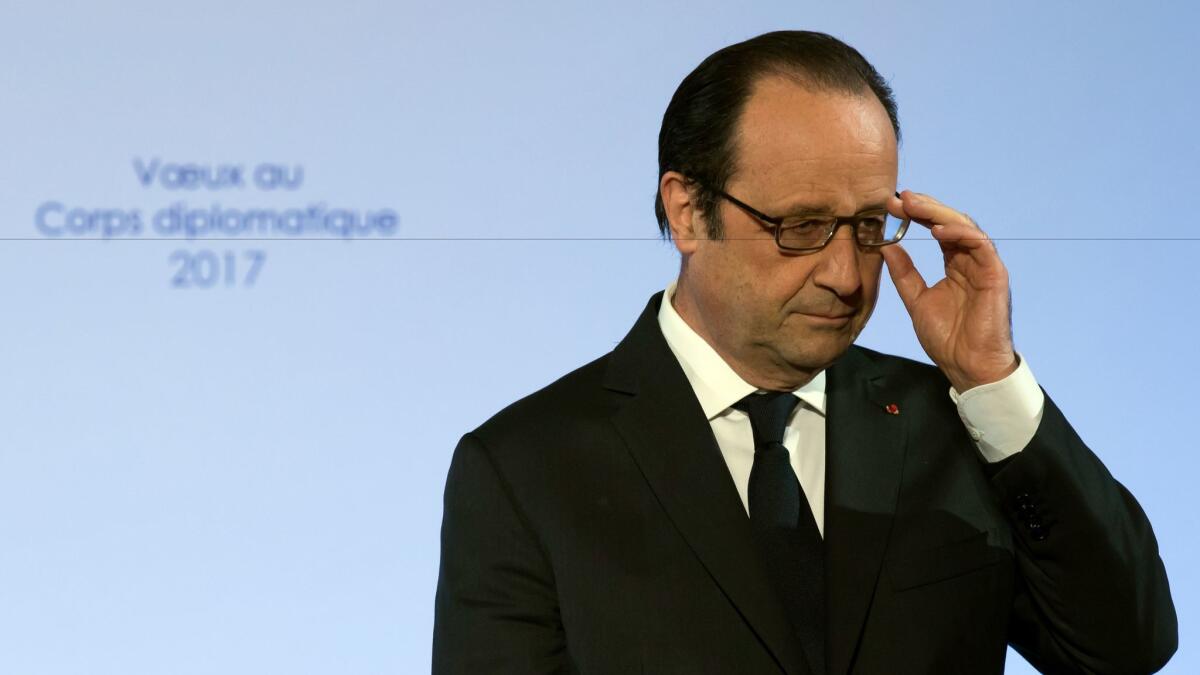France’s Mideast peace conference is branded a failure before the doors even open

Reporting from Paris — Foreign ministers and top international envoys from 70 countries are jetting into Paris for a Middle East peace conference Sunday.
Sounds positive — except the Israelis and the Palestinians won’t be there. Neither will the incoming U.S. administration. And French President Francois Hollande, who has been leading a last-ditch effort to revive talks aimed at easing the long-stalemated conflict, will be out of office in four months.
The aim of the conference, Hollande said in a speech to France’s diplomatic corps Thursday, is to reaffirm the international community’s support for a “two-state solution” that would see the establishment of an independent Palestinian state.
It has been branded a failure even before the doors have opened.
Israeli Prime Minister Benjamin Netanyahu, speaking in Jerusalem on Thursday, said the conference was “rigged” against Israel and declined to meet with Hollande to discuss the results.
“This pushes peace backwards,” he said. “It’s not going to obligate us. It’s a relic of the past.”
Netanyahu is angry about a United Nations Security Council resolution passed in December that condemns Israeli settlement-building on land in East Jerusalem and the West Bank claimed by Palestinians. He is even more furious that President Obama’s administration did not use its veto power to block the measure.
Secretary of State John F. Kerry, who is making one of his last official appearances at Sunday’s conference, portrayed the U.S. failure to quash the resolution as an expression of American support for a two-state solution.
But French diplomats are worried that President-elect Donald Trump could upend decades of U.S. policy in the Mideast by giving Israel a freer hand to expand settlements and by relocating the U.S. Embassy from Tel Aviv to Jerusalem, which both sides claim as their capital.
David Friedman, Trump’s longtime real estate lawyer who has been named the next U.S. ambassador to Israel, wrote in October that Trump “will not attempt to impose a ‘two-state solution,’ or any other ‘solution,’ against the wishes of the democratically elected Israeli government.”
Palestinian Authority President Mahmoud Abbas had been expected in Paris on Sunday but postponed the visit. French officials suggested that he would come for bilateral talks in the coming weeks.
In an interview with Le Figaro newspaper on Friday, Abbas was supportive of the French initiative.
“We hope this conference will give rise to an international effort along with a calendar to drive negotiations and put in place the agreement that results, with the aim of ending the occupation, including that of East Jerusalem,” he said.
However, Abbas cautioned that a decision to move the U.S. Embassy would not be good for peace. Palestinians might consider withdrawing their recognition of Israel, he said, a key part of the 1993 Oslo Accords.
The Vatican stepped into the fray Saturday, emphasizing the sacred character of Jerusalem.
In a statement issued after Abbas met with Pope Francis, the Vatican did not refer directly to the contested city, but said that during the talks “emphasis was placed on the importance of safeguarding the sanctity of the holy places for believers of all three of the Abrahamic religions.”
The Vatican recognized Palestinian statehood in June 2015 — a decision that angered Israel — and Abbas opened a Palestinian Embassy to the Holy See during his visit.
Israelis and Palestinians haven’t participated in negotiations since the collapse of a U.S.-led peace effort in 2014. Although violence between them has diminished since the end of the last major Palestinian uprising more than a decade ago, a series of attacks by Palestinians has raised tensions, as has Israeli settlement-building.
Experts agree there is little chance that Sunday’s conference will achieve much.
Aaron David Miller, a former U.S. peace negotiator and an advisor to both Republican and Democratic administrations, told the Woodrow Wilson International Center for Scholars in Washington that “like rock ’n’ roll, the peace process will never die, but under these circumstances, it’s not going to succeed.”
Even Hollande has played down the prospects of a breakthrough.
“I am realistic about what this conference can achieve,” he said Thursday. “Peace will only be achieved by the Israelis and Palestinians and nobody else. Only bilateral negotiations can succeed.”
Willsher is a special correspondent.
More to Read
Sign up for Essential California
The most important California stories and recommendations in your inbox every morning.
You may occasionally receive promotional content from the Los Angeles Times.










